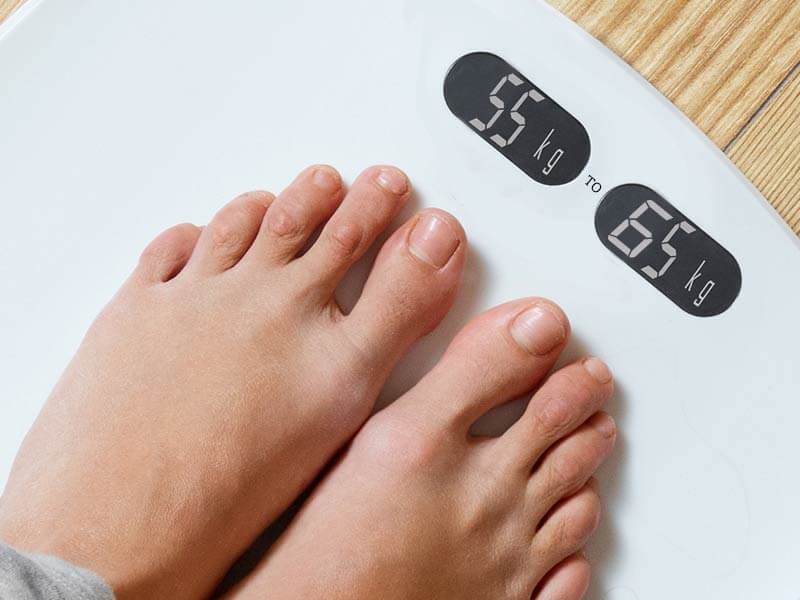It is very common for people to experience fluctuations in their weight. Thus, A person may gain or lose weight over time. But if you have gained weight in a very short period of time, there could be some underlying reasons for this. In this article, we have listed 11 causes for rapid weight gain in women as well as the symptoms and when to consult a doctor.
Some of the common causes of a weight gain are:
- Lack of sleep
- Being less physically active
- Menstrual cycle
- Eating more
- Stress, depression or anxiety
- Water retention which may due to dehydration or excess salt
- Metabolism slowing down with age
- Perimenopause and menopause
It is recommended that if your weight gain isn’t due to any of the causes listed above, you should consult a doctor.
In This Article:
11 Causes of Rapid Weight Gain in Women
Insomnia
According to the research, lack of sleep is linked with gaining weight. Changes in sleep cycles can affect the mood and eating patterns that can cause people to overeat. As per a 2013 study, people who are sleep deprived consumed more carbohydrates than were required to meet their energy needs. This leads to weight gain.
Polycystic Ovary Syndrome
People with PCOS may gain weight very easily around their middle. It causes the ovaries to produce high levels of male sex hormones. As per now, there is no cure for PCOS but you may be recommended certain lifestyle changes by your doctor that may include exercising more and eating a healthy diet.
Symptoms of PCOS are:
- Acne
- Hair loss or thinning hair
- Excess hair growth on back, chest or abdomen
- Irregular periods
- Dark patches of skin around the breasts, neck or armpits.
Kidney Issues
If the kidneys stop functioning properly, your body may begin to retain fluid that may result in weight gain. When the kidneys are damaged, they may not be able to remove waste and fluids from the body properly, which may then build up in the tissues. A few symptoms that may indicate an issue with the kidneys are:
- Loss of appetite
- Muscle cramps
- Headaches
- Urine that looks foamy
- Not urinating very much
- Fatigue
- Difficulty concentrating or confusion
- Itchiness
- Joint pain
Cirrhosis
Cirrhosis may be the cause if people experience rapid weight gain and if the abdomen looks enlarged. In this condition, the scar tissue replaces healthy tissue in the liver, which may cause the fluid to build up in the abdominal cavity. A few symptoms of cirrhosis are:
- Swollen ankles
- Breathing difficulties
- Abdominal pain
Thyroid Disorder
Hypothyroidism is a thyroid disorder that can slow down the metabolism, resulting in weight gain. This can also cause the body to retain fluid because of the effects of hypothyroidism on the kidneys. A few symptoms of hypothyroidism are;
- Feeling cold
- Dry skin and hair
- Stiff joints and aching muscles
- Constipation
- Brittle nails
- Stiff joints
- Aching muscles
Ovarian Cancer
Ovarian cancer may also lead to unexplained weight gain and bloating. Often times, ovarian cancer reaches the later stages without any detection. In case, you experience pain in the pelvic region, speak to a doctor. Symptoms of ovarian cancer include:
- Indigestion
- Unusual menstrual cycle
- Difficulty sleeping
- Abdominal pain or pain in the pelvis
- Loss of appetite or feeling full quickly
- Urgent need to urinate
Acromegaly
In this hormonal condition, the pituitary gland produces too much growth hormone. Enlargement of the hands and feet are some of the common symptoms of acromegaly. Not only this, but the lips, nose and tongue may also become enlarged. Surgery or radiation therapy may be required to remove a benign tumour on the pituitary gland. Symptoms of acromegaly are:
- Excessive sweating
- Skin tags
- Aching joints
- Obstructive sleep apnea and snoring
- A deeper voice
Heart Failure
In case you experience rapid weight gain in particular areas of the body, fluid retention may be the cause and that may also be a sign of heart failure. If the blood flow is slow too and from the heart, other major organs in the body may be affected due to that. This leads to fluid collection in the tissues that result in weight gain and swelling. Weight gain with swelling may be experienced in the:
- Legs
- Feet
- Ankles
- Stomach area
Some other signs of heart failure include:
- Frequent coughing
- Loss of appetite
- Difficulty speaking or lying flat
- Dizziness or confusion
- Feeling breathless when resting
- Fluid collecting inside the lungs
- Loss of appetite
Cushing’s Syndrome
This occurs when the body produces too much cortisol over a prolonged period of time. This hormone enables the body to respond to stress. This syndrome is usually a side effect of taking glucorticoids. These are the drugs that are used to treat conditions like asthma, systemic lupus erythematosus, and rheumatoid arthritis. Cushing’s syndrome may lead to weight in these areas of the body:
- Upper body
- Face
- Abdomen
- Neck
People may also be able to notice;
- Erectile dysfunction in males
- Fatigue
- Muscle weakness
- Irregular menstrual cycle in females
- Bruising
Quitting smoking
You may experience weight gain initially when you stop smoking tobacco products. According to the research, 1 kilogram is the average weight gain in the first month after you quit smoking. The majority of your weight will seem to occur in the first 3 months and it will tend to slow down by the 6 months mark.
Medication
There are certain medications that can cause people to gain weight rapidly. Some of the drugs that are used to treat the following conditions can lead to weight gain:
- Diabetes Mellitus
- High blood pressure
- Seizures
- Depression and psychiatric disorders
How is Unintentional Rapid Weight Gain Women Diagnosed?
In case, you are experiencing rapid weight gain and there is no underlying cause behind it, it is recommended that you consult a doctor. You will be asked about your medical history as well as any other symptoms (if any). Apart from that, a physical examination or blood tests may also be carried out. A blood sample will help check the hormone levels, liver function, kidney function and other health markers that can be the cause. MRI, CT scan, ultrasound, and plain film X-ray may also be necessary to perform.
However, rapid weight gain can be a sign of an underlying health condition which may be related to thyroid, kidneys or heart. If you experience rapid and unexplained weight gain, then you should see a doctor determine the underlying cause and develop a treatment plan.
Sources:
- https://edition.cnn.com/2019/06/10/health/sleep-light-weight-gain-study/index.html
- https://www.hsph.harvard.edu/obesity-prevention-source/obesity-causes/diet-and-weight/













